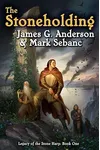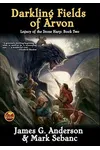Step into the enchanting world of Legacy of the Stone Harp, where epic quests, ancient bards, and a magical harp weave a tale of heroism in the realm of Ahn Norvys! This epic fantasy series by James G. Anderson and Mark Sebanc invites readers to follow Kalaquinn Wright, a young highlander thrust from a quiet life into a destiny that could save or doom his world. With its Tolkien-esque depth and Celtic-inspired lore, the series is a hidden gem for fantasy lovers craving immersive storytelling.
Picture a land where the Sacred Fire flickers and the golden harp, Talamadh, holds the key to harmony. Legacy of the Stone Harp blends adventure, mythology, and heart, making it a must-read for those who love epic journeys with a touch of lyrical magic. Ready to explore this captivating saga? Let’s dive in!
How Legacy of the Stone Harp Began
The Legacy of the Stone Harp series was born from the creative minds of James G. Anderson, a theologian and poet from Saskatchewan, and Mark Sebanc, a classicist and Tolkien scholar from Ontario. Inspired by J.R.R. Tolkien’s intricate world-building and Celtic mythology, the duo set out to craft an epic fantasy that echoed the grandeur of Middle-earth while carving its own path. Published by Baen Books, the series debuted in 2009, marking Baen’s bold entry into epic fantasy. Anderson and Sebanc’s shared passion for music, history, and storytelling shaped Ahn Norvys, a world rich with lore and tradition.
The Heart of Legacy of the Stone Harp
The series kicks off with The Stoneholding (2009), where darkness looms over Ahn Norvys after the abduction of Prince Starigan. The Stoneholding, a highland stronghold, is razed by the tyrant Ferabek, forcing High Bard Wilum and his apprentice, Kal, to flee with the sacred Talamadh. Kal, a wheelwright’s son, embarks on a perilous quest to find the lost prince and restore harmony. The sequel, Darkling Fields of Arvon (2010), follows Kal, now High Bard, as he navigates a war-torn world to recover the Talamadh from Ferabek’s clutches.
The series shines through its themes of destiny, sacrifice, and the power of music. The Talamadh, a harp that binds heaven and earth, symbolizes hope and unity, while Kal’s journey from naive youth to hero mirrors classic coming-of-age tales. The Celtic-inspired setting, with its lush landscapes and ancient clans, immerses readers in a world both familiar and fresh. Anderson and Sebanc’s lyrical prose, packed with songs and poems, evokes the oral traditions of bards, though some find the detailed descriptions slow-paced. Fans, however, praise the vivid world-building and Kal’s endearing courage.
Why Legacy of the Stone Harp Resonates
Though not as widely known as The Lord of the Rings, Legacy of the Stone Harp has carved a niche among epic fantasy enthusiasts. Its blend of Tolkien’s depth and Celtic mysticism appeals to readers seeking stories that linger in the imagination. Fans on platforms like Goodreads and Amazon praise its rich mythology and Kal’s relatable heroism, with some calling it a “lyrical epic” best savored aloud. The series’ focus on music as magic sets it apart, offering a refreshing take on fantasy tropes. While only two books have been published, the planned five-book saga holds promise for a lasting legacy.
- Publication Years: 2009 (The Stoneholding), 2010 (Darkling Fields of Arvon)
- Authors: James G. Anderson and Mark Sebanc
- Publisher: Baen Books
- Setting: The mythical world of Ahn Norvys
Grab The Stoneholding and dive into Legacy of the Stone Harp’s epic fantasy world! Whether you’re a fan of heroic quests or enchanted harps, this series will sweep you away to Ahn Norvys. Happy reading!

